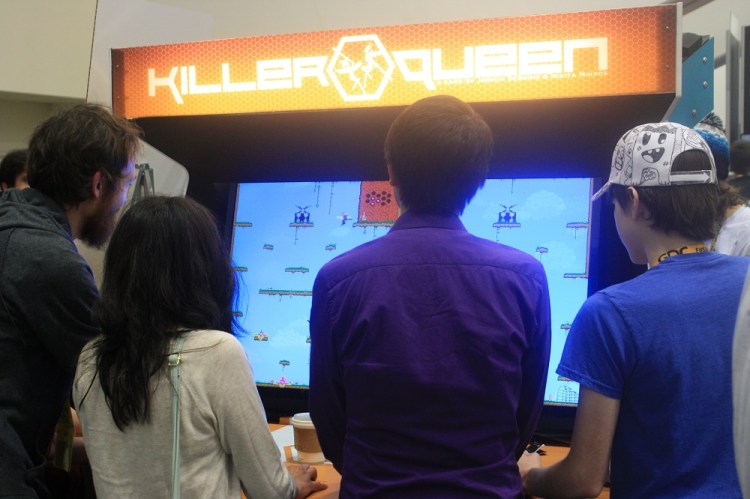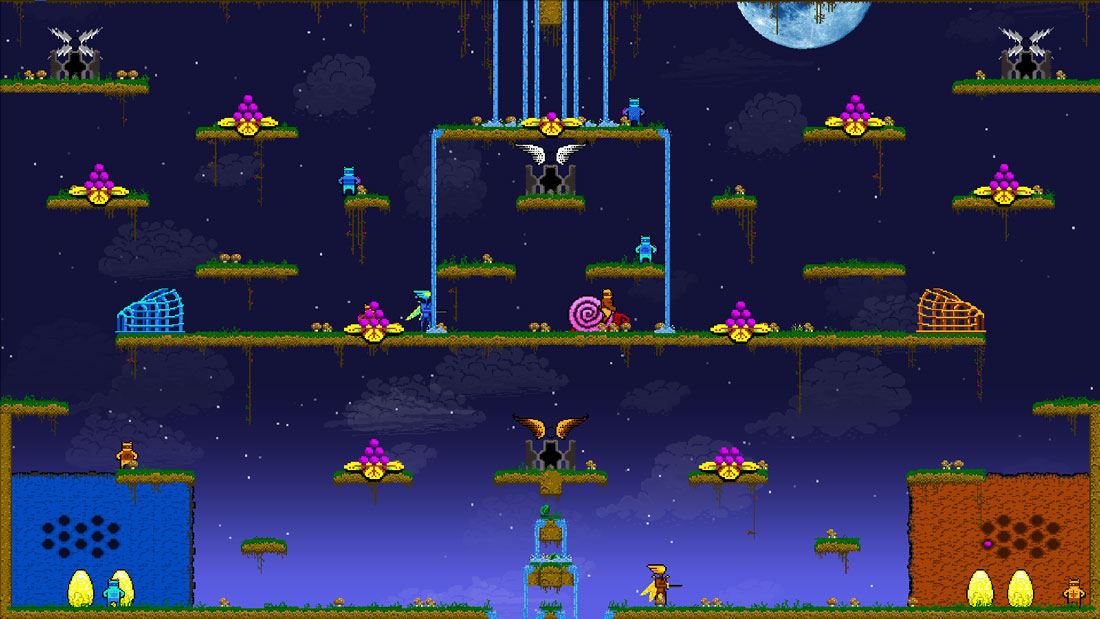Esports might have a future home in arcades. No, we’re not back in the ’80s.
Joshua DeBonis and Nikita Mikros of Bumble Bear Games talked at the Game Developers Conference in San Francisco today about its latest project, Killer Queen. It’s a 10-player experience that pits two teams of five against each other in an enviroment similar to the classic Joust, which tasked players with maneuvering flapping birds around the screen and killing opponents by landing on them. What makes Killer Queen unique, however, is its platform. It’s only for arcades.
Most consider arcades a dying format, with cabinets usually showing up in movie theater lobbies or hipster bars in trendy cities. However, Killer Queen is the rare, new arcade game worth talking about. Esports are a huge market, with market research firm Newzoo expecting the sector to grow to $1.1 billion by 2019. However, most popular esports games are online and on PC or consoles.
In a lot of ways, Killer Queen is a small game. The insanely popular online competitive game League of Legends has 13.5 million Likes on Facebook. The fighting series Street Fighter has 2.1 million. DeBonis noted, with just a bit of his tongue in his cheek, that Killer Queen has “1.7 hundred” likes.
Still, that doesn’t mean that Killer Queen hasn’t had a large impact for some. Anna Thornton played the game weekly in Brooklyn, and she said that the social element of the arcade experience helped her overcome her shyness. When she moved from New York to Chicago, she immediately made new friends with the Killer Queen community there.
“We’re on a mission to revolutionize arcades,” Mikros said. “Friendship is more important than competition.” He and DeBonis play the game regularly with Brooklyn fans. They also travel to the other cities that have the game when they can.
Early on, the game only appeared at festivals. Logan Arcade in Chicago was the first place the game had a permanent home. A community quickly grew around the cabinet. Mikros noted that a stable venue was crucial for the game to develop a following.
Mikros said that its community is friendly while staying competitively. He attributes that to people actually have to play the game standing next to each other, which is a much more social atmosphere than playing a game online with a faceless voice. Mikros also said that arcades and bars attract an older, more mature crowd.
Killer Queen is spread out in different regions in the U.S. DeBonis noted that some players will travel between cities to play each other. He also said that each region has developed its own subculture. Still, DeBonis noted that its community is still vulnerable to toxic players. The Portland Killer Queen fans realized that its group was beginning to shrink because of a few obnoxious players. The community began to ostricize those toxic players until they left, which helped to bring in new fans. He also said that sometimes specific teams become so powerful that it can discourage others. However, DeBonis noted that these teams will often notice when this happens and split up for the good of the game. Both are examples of the community policing itself.
That you can’t play Killer Queen at home is a deliberate choice of the developers. However, the Internet is still an important tool for the game, since players use social media networks to plan when they’ll play together. Some players will also stream tournaments on Twitch.
Right now, only about 10 Killer Queen machines exist in public, but BumbleBear Games is creating new cabinets. DeBonis noted that it hasn’t been an easy road for them, but they have started making money with Killer Queen. So, maybe the arcade revolution isn’t imminent, but this classic format might be crawling its way back to relevancy.
VentureBeat's mission is to be a digital town square for technical decision-makers to gain knowledge about transformative enterprise technology and transact. Learn More


